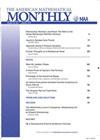未知概率下的赌博作为不确定性下真实世界决策的代理
IF 0.4
4区 数学
Q4 MATHEMATICS
引用次数: 0
摘要
在未来事件不确定的情况下进行决策,如果缺乏足够的理论或数据来进行可靠的概率评估,这对任何定量分析都是一个挑战。本文提出了一种首先了解这个主题的方法。我们在一个框架内给出了一些基本的例子,用于研究概率仅大致已知的不确定情况下的决策。在赌博的框架中,赌注的大小与赌徒的感知优势成正比,基于他们的感知概率,他们估计真实概率的准确性是通过均方误差来衡量的。在这个框架内,人们可以研究估计错误的代价,并寻求形式化“明显”的概念,即在行为依赖于感知概率的代理之间的竞争互动中,那些在估计概率方面更准确的人通常会比那些不太准确的人更成功。本文是2021年荷兰数学大会上布劳威尔奖演讲的扩展版本。本文章由计算机程序翻译,如有差异,请以英文原文为准。
Gambling Under Unknown Probabilities as Proxy for Real World Decisions Under Uncertainty
Abstract The subject of decisions under uncertainty about future events, if lacking sufficient theory or data to make confident probability assessments, poses a challenge for any quantitative analysis. This article suggests one way to first look at this subject. We give elementary examples within a framework for studying decisions under uncertainty where probabilities are only roughly known. The framework, in gambling terms, is that the size of a bet is proportional to the gambler’s perceived advantage based on their perceived probability, and their accuracy in estimating true probabilities is measured by mean-squared-error. Within this framework one can study the cost of estimation errors, and seek to formalize the “obvious” notion that in competitive interactions between agents whose actions depend on their perceived probabilities, those who are more accurate at estimating probabilities will generally be more successful than those who are less accurate. This article is an extended version of the Brouwer Medal talk at the 2021 Nederlands Mathematisch Congres.
求助全文
通过发布文献求助,成功后即可免费获取论文全文。
去求助
来源期刊

American Mathematical Monthly
Mathematics-General Mathematics
CiteScore
0.80
自引率
20.00%
发文量
127
审稿时长
6-12 weeks
期刊介绍:
The Monthly''s readers expect a high standard of exposition; they look for articles that inform, stimulate, challenge, enlighten, and even entertain. Monthly articles are meant to be read, enjoyed, and discussed, rather than just archived. Articles may be expositions of old or new results, historical or biographical essays, speculations or definitive treatments, broad developments, or explorations of a single application. Novelty and generality are far less important than clarity of exposition and broad appeal. Appropriate figures, diagrams, and photographs are encouraged.
Notes are short, sharply focused, and possibly informal. They are often gems that provide a new proof of an old theorem, a novel presentation of a familiar theme, or a lively discussion of a single issue.
Abstracts for articles or notes should entice the prospective reader into exploring the subject of the paper and should make it clear to the reader why this paper is interesting and important. The abstract should highlight the concepts of the paper rather than summarize the mechanics. The abstract is the first impression of the paper, not a technical summary of the paper. Excessive use of notation is discouraged as it can limit the interest of the broad readership of the MAA, and can limit search-ability of the article.
 求助内容:
求助内容: 应助结果提醒方式:
应助结果提醒方式:


